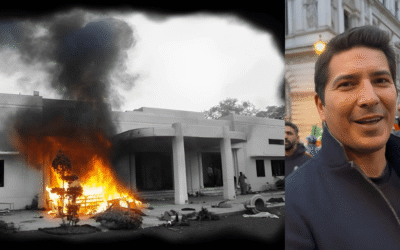In an age where digital platforms transcend borders, Pakistan finds itself grappling with a growing challenge: how to legally counter disinformation campaigns by individuals like Major (Retired) Adil Raja, who operate from abroad. Raja, once a decorated officer, has now turned into an internet-based propagandist targeting the very institution that shaped his career. His online content—laden with unverifiable accusations and defamatory rhetoric—has raised serious questions about Pakistan’s legal capacity to act against exiled provocateurs. As online defamation becomes a tool for ideological warfare, a comprehensive policy debate is now urgently underway, on July 8, 2025.
Pakistan’s Cyber Defamation Framework
Pakistan’s legal response to online defamation is anchored in the Prevention of Electronic Crimes Act (PECA) 2016. Under Section 20 of PECA, any act of publicly displaying false, intimidating, or harmful content that causes reputational damage is a punishable offence, with penalties ranging from fines to imprisonment. The 2022 PECA amendment made such offences cognisable and non-bailable, increasing jail terms to five years—a move widely supported by legal experts and state institutions as a necessary safeguard against digital misconduct.
In addition, the Punjab Defamation Act 2024 introduced new legal forums at the provincial level, allowing for faster adjudication and increased fines of up to Rs 3 million. These developments reflect the state’s seriousness in preserving institutional integrity and individual dignity in the online domain. However, the law’s effectiveness is naturally limited by jurisdictional boundaries, especially in cases like Raja’s, where the offender resides outside Pakistan.
Cross-Border Jurisdiction: A Legal Hurdle
Despite strong domestic laws, Pakistan faces limitations when attempting to take action against individuals based overseas. Adil Raja, currently based in the United Kingdom, leverages this legal gap to disseminate anti-state rhetoric with near impunity. While UK courts did rule against Raja in a defamation case filed by retired Brigadier Rashid Naseer, Pakistan itself lacks a direct mechanism to prosecute Raja under its laws without international legal cooperation.
The absence of extradition treaties or mutual legal assistance agreements (MLAs) with several Western nations further complicates matters. Even where treaties exist, cyber offences involving freedom of expression often fall into grey zones. Unless there is dual criminality—where an offence is considered criminal in both countries—extradition or prosecution becomes difficult.
Moreover, international platforms such as YouTube and X (formerly Twitter) follow the jurisdiction of their host country, making content takedown or data retrieval dependent on bilateral diplomatic engagement. Without a robust cross-border legal framework, PECA’s enforcement is largely restricted within Pakistan’s territorial bounds.
Strengthening Global Legal Coordination
To address this growing policy gap, Pakistan must adopt a multi-layered approach. First, it must engage in diplomatic outreach to expand existing MLAs and negotiate bilateral treaties specifically covering cyber defamation and disinformation. Countries like the UK and UAE, which host large Pakistani diasporas, should be top priorities for such legal alignment.
Second, Pakistan should consider signing and ratifying the Budapest Convention on Cybercrime, the only international treaty that addresses internet and computer crime by harmonising national laws and facilitating international cooperation. Although concerns have been raised about its Western-dominated framework, careful negotiation can ensure that national interests are preserved while enhancing legal reciprocity.
Third, the state must invest in capacity building. Agencies like the Federal Investigation Agency’s Cyber Crime Wing and the newly proposed National Cyber Crimes Investigation Agency (NCCIA) should be equipped with legal experts and digital forensic analysts capable of handling complex, transnational cases. Their role would not be limited to investigation but would include cross-border coordination, evidence preservation, and case preparation for potential foreign trials.
Finally, Pakistan’s foreign missions must play a proactive role. Legal attachés or cyber liaison officers could assist in navigating host country legal systems, securing evidence, and following up on litigation involving anti-state actors abroad. These measures would not only strengthen the state’s legal footing but also send a clear message: digital borders are not safe havens for defamation and sedition.
Why This Matters for National Security
The impact of online defamation extends far beyond personal grievances. Individuals like Adil Raja not only malign Pakistan’s military and judicial institutions but also provide rhetorical ammunition to hostile foreign media and anti-Pakistan actors. When Indian outlets or diaspora-driven forums echo such narratives, they shape global perception and erode Pakistan’s diplomatic standing.
Moreover, the unchecked spread of digital propaganda can fuel domestic unrest, weaken public confidence in state institutions, and embolden other fringe voices. Left unaddressed, this can morph into a broader campaign of psychological warfare, undermining Pakistan’s sovereignty in the information age.
Thus, defending against online defamation is not merely a legal issue; it is a matter of national security.
Pakistan’s current legal tools, including PECA and the Punjab Defamation Act, provide a strong foundation to counter cyber defamation. However, the limitations of jurisdictional enforcement demand immediate attention. To address cases like Adil Raja’s, Pakistan must expand its legal alliances, strengthen international coordination, and develop institutional expertise to enforce accountability beyond its borders. The digital age offers anonymity and reach, but a sovereign state must never be powerless against online actors who defame with impunity. The time to close this policy gap is now.
You may be Intrested In:







